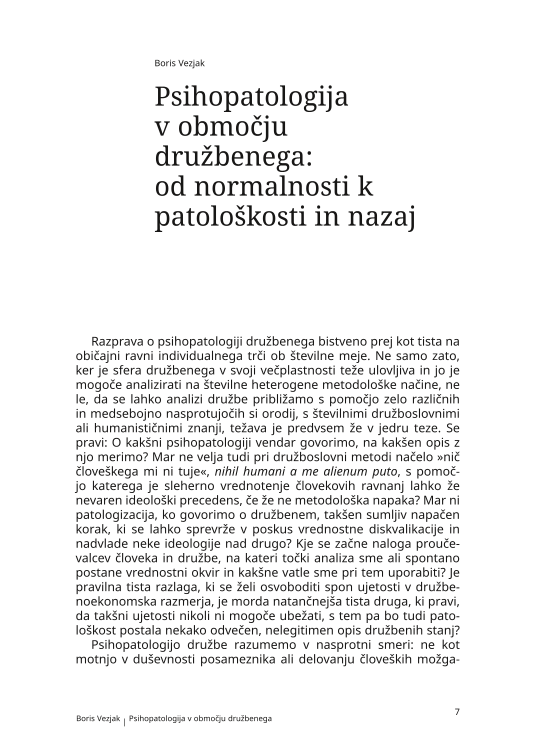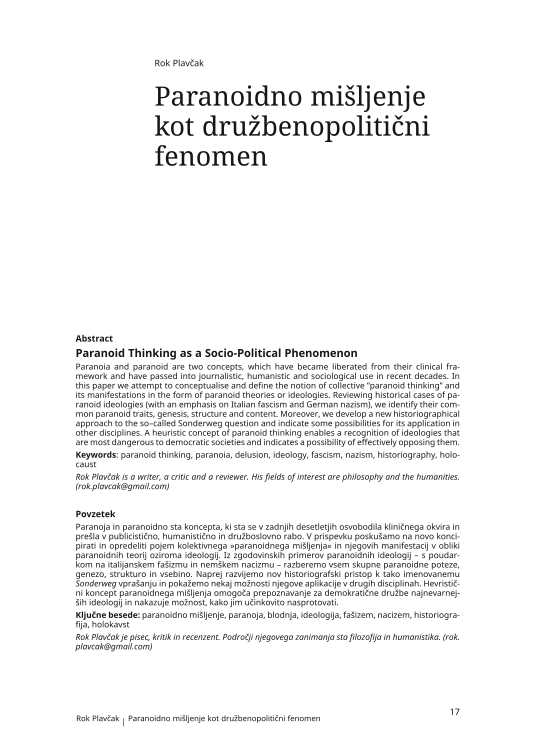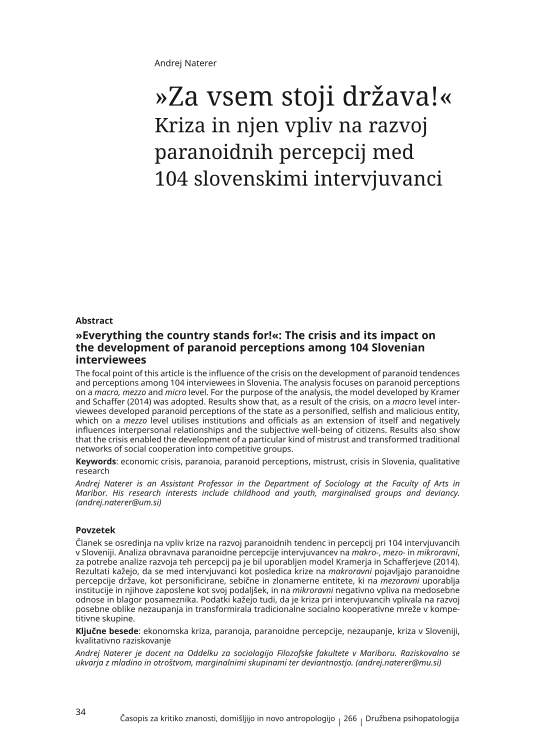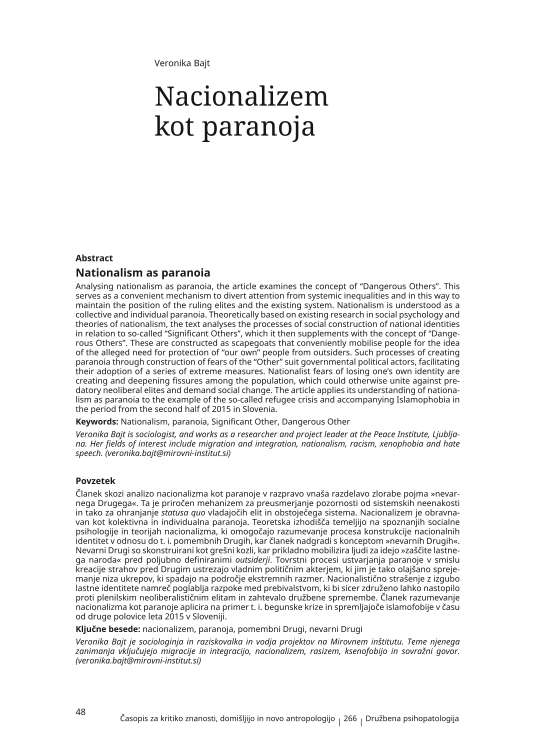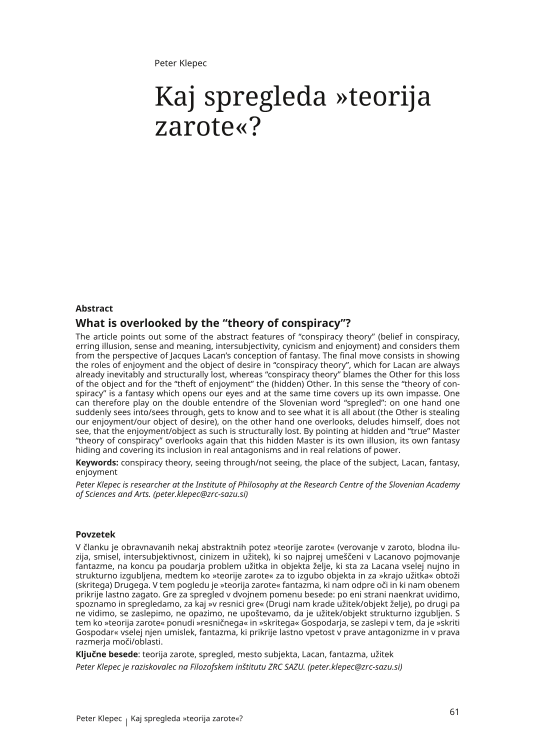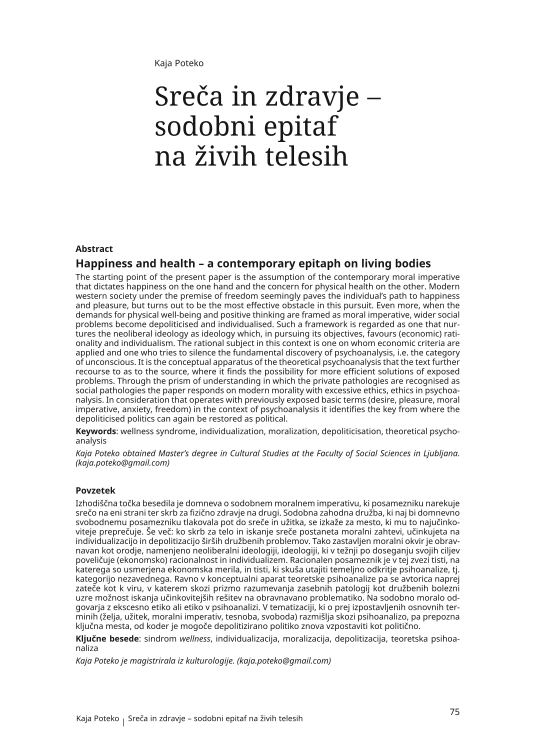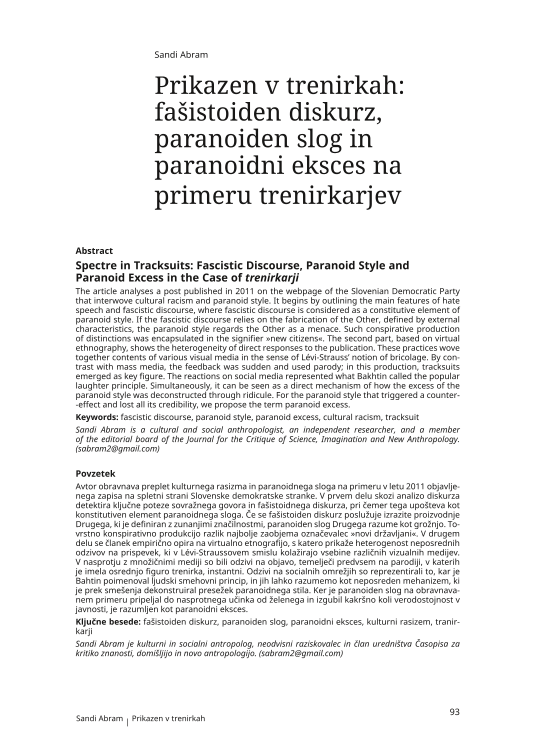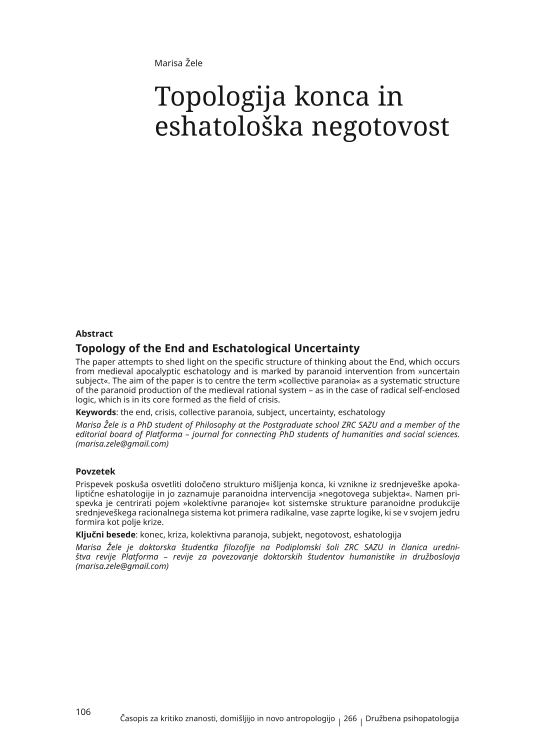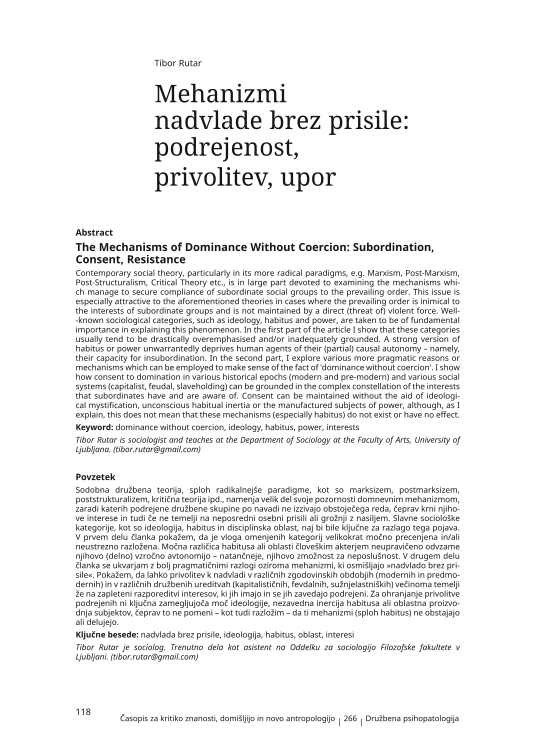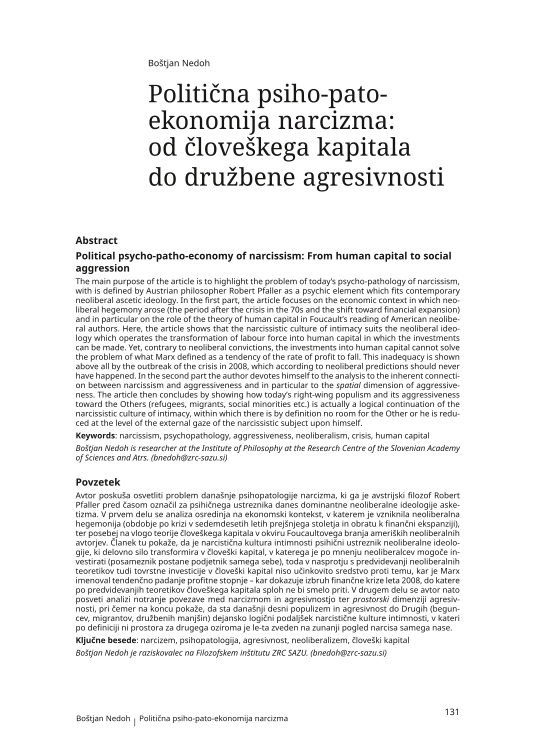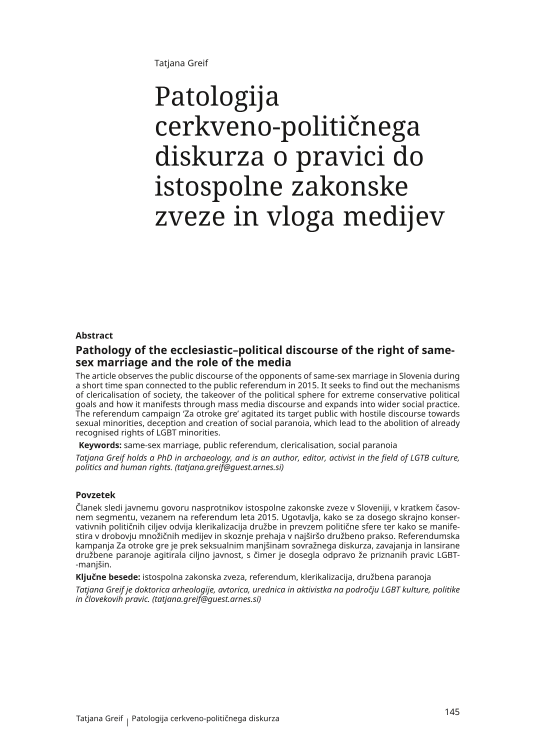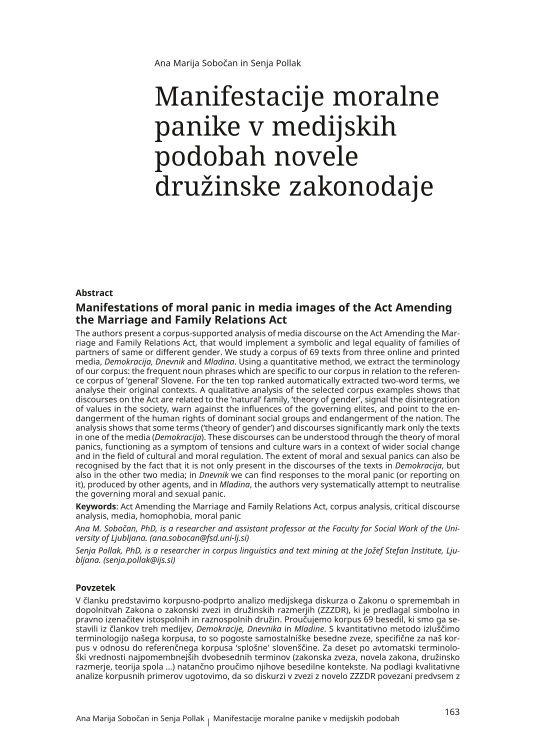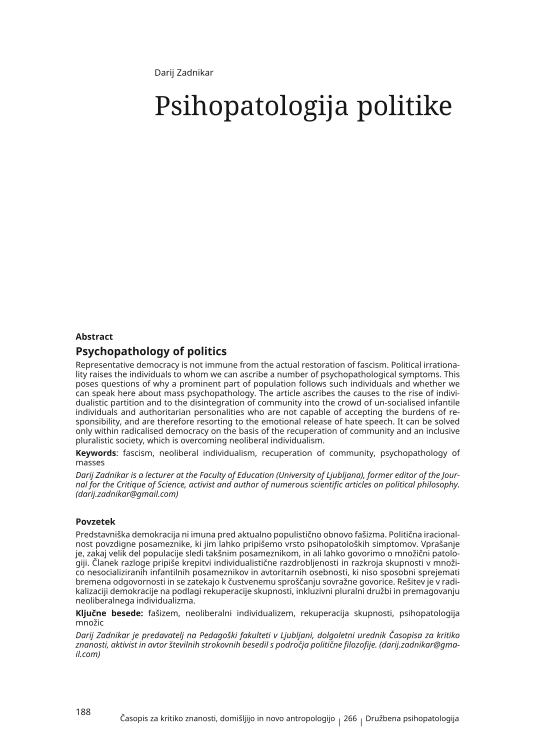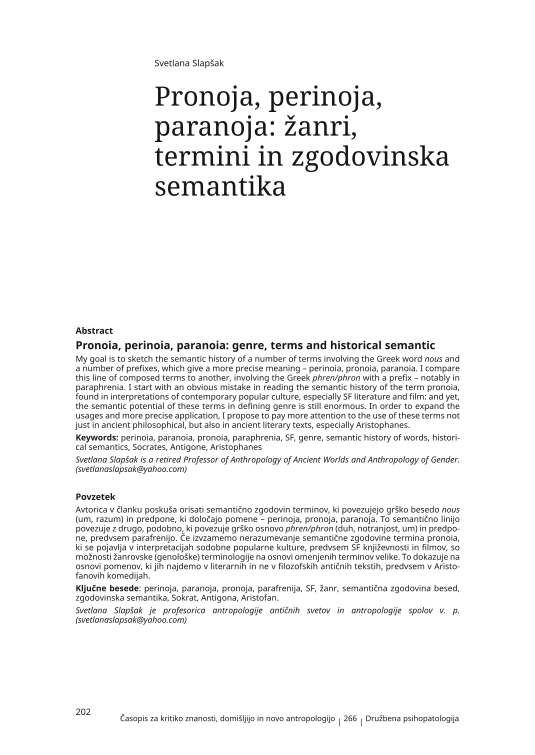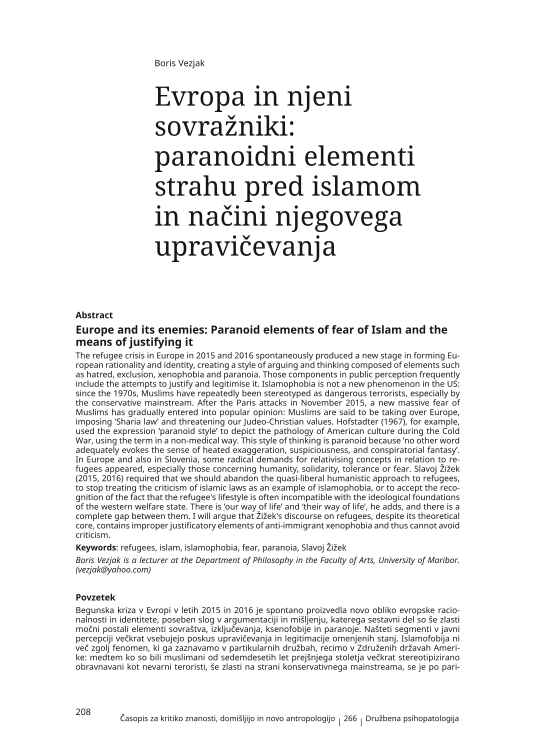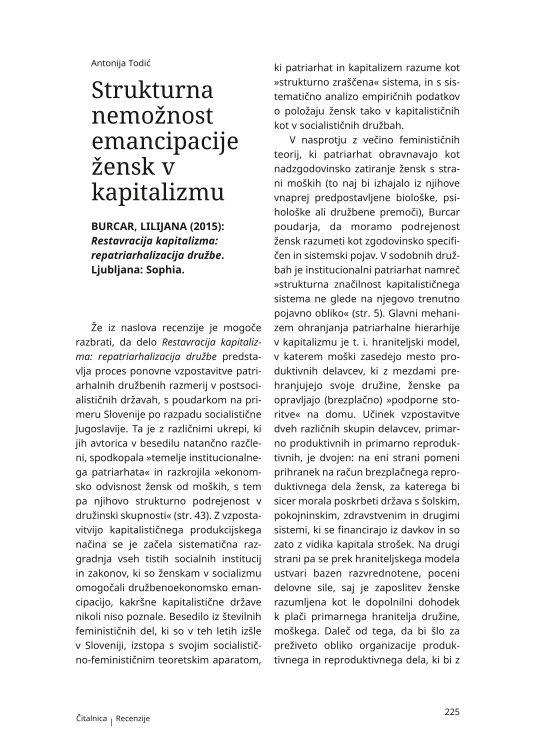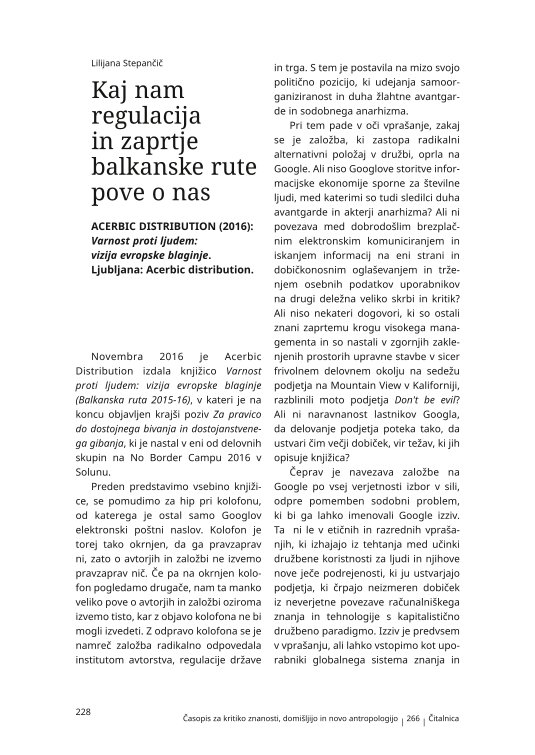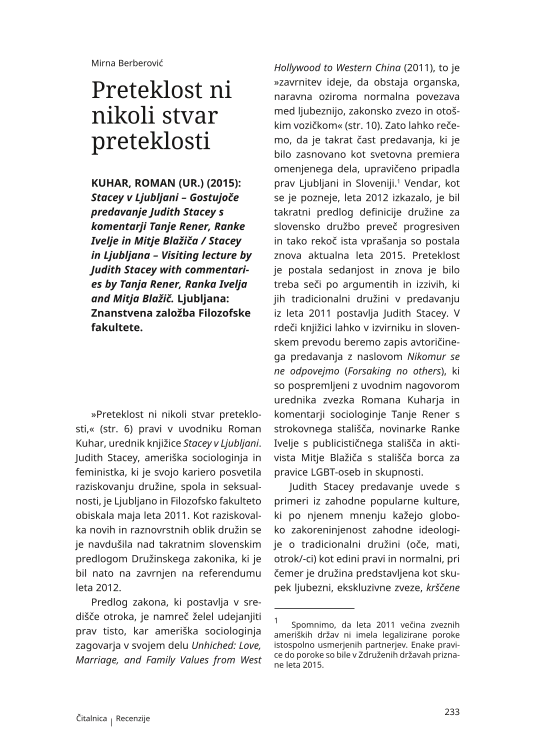Razprava o psihopatologiji družbenega bistveno prej kot tista na običajni ravni individualnega trči ob številne meje. Ne samo zato, ker je sfera družbenega v svoji večplastnosti teže ulovljiva in jo je mogoče analizirati na številne heterogene metodološke načine, ne le, da se lahko analizi družbe približamo s pomočjo zelo različnih in medsebojno nasprotujočih si orodij, s številnimi družboslovnimi ali humanističnimi znanji, težava je predvsem že v jedru teze. Se pravi: O kakšni psihopatologiji vendar govorimo, na kakšen opis z njo merimo? Mar ne velja tudi pri družboslovni metodi načelo »nič človeškega mi ni tuje«, nihil humani a me alienum puto, s pomočjo katerega je sleherno vrednotenje človekovih ravnanj lahko že nevaren ideološki precedens, če že ne metodološka napaka? Mar ni patologizacija, ko govorimo o družbenem, takšen sumljiv napačen korak, ki se lahko sprevrže v poskus vrednostne diskvalikacije in nadvlade neke ideologije nad drugo? Kje se začne naloga proučevalcev človeka in družbe, na kateri točki analiza sme ali spontano postane vrednostni okvir in kakšne vatle sme pri tem uporabiti? Je pravilna tista razlaga, ki se želi osvoboditi spon ujetosti v družbenoekonomska razmerja, je morda natančnejša tista druga, ki pravi, da takšni ujetosti nikoli ni mogoče ubežati, s tem pa bo tudi patološkost postala nekako odvečen, nelegitimen opis družbenih stanj?
Paranoia and paranoid are two concepts, which have became liberated from their clinical framework and have passed into journalistic, humanistic and sociological use in recent decades. In this paper we attempt to conceptualise and define the notion of collective ’’paranoid thinking’’ and its manifestations in the form of paranoid theories or ideologies. Reviewing historical cases of paranoid ideologies (with an emphasis on Italian fascism and German nazism), we identify their common paranoid traits, genesis, structure and content. Moreover, we develop a new historiographical approach to the so–called Sonderweg question and indicate some possibilities for its application in other disciplines. A heuristic concept of paranoid thinking enables a recognition of ideologies that are most dangerous to democratic societies and indicates a possibility of effectively opposing them.
The focal point of this article is the influence of the crisis on the development of paranoid tendences and perceptions among 104 interviewees in Slovenia. The analysis focuses on paranoid perceptions on a macro, mezzo and micro level. For the purpose of the analysis, the model developed by Kramer and Schaffer (2014) was adopted. Results show that, as a result of the crisis, on a macro level interviewees developed paranoid perceptions of the state as a personified, selfish and malicious entity, which on a mezzo level utilises institutions and officials as an extension of itself and negatively influences interpersonal relationships and the subjective well-being of citizens. Results also show that the crisis enabled the development of a particular kind of mistrust and transformed traditional networks of social cooperation into competitive groups.
Analysing nationalism as paranoia, the article examines the concept of “Dangerous Others”. This serves as a convenient mechanism to divert attention from systemic inequalities and in this way to maintain the position of the ruling elites and the existing system. Nationalism is understood as a collective and individual paranoia. Theoretically based on existing research in social psychology and theories of nationalism, the text analyses the processes of social construction of national identities in relation to so-called “Significant Others”, which it then supplements with the concept of “Dangerous Others”. These are constructed as scapegoats that conveniently mobilise people for the idea of the alleged need for protection of “our own” people from outsiders. Such processes of creating paranoia through construction of fears of the “Other” suit governmental political actors, facilitating their adoption of a series of extreme measures. Nationalist fears of losing one’s own identity are creating and deepening fissures among the population, which could otherwise unite against predatory neoliberal elites and demand social change. The article applies its understanding of nationalism as paranoia to the example of the so-called refugee crisis and accompanying Islamophobia in the period from the second half of 2015 in Slovenia.
The article points out some of the abstract features of “conspiracy theory” (belief in conspiracy, erring illusion, sense and meaning, intersubjectivity, cynicism and enjoyment) and considers them from the perspective of Jacques Lacan’s conception of fantasy. The final move consists in showing the roles of enjoyment and the object of desire in “conspiracy theory”, which for Lacan are always already inevitably and structurally lost, whereas “conspiracy theory” blames the Other for this loss of the object and for the “theft of enjoyment” the (hidden) Other. In this sense the “theory of conspiracy” is a fantasy which opens our eyes and at the same time covers up its own impasse. One can therefore play on the double entendre of the Slovenian word “spregled”: on one hand one suddenly sees into/sees through, gets to know and to see what it is all about (the Other is stealing our enjoyment/our object of desire), on the other hand one overlooks, deludes himself, does not see, that the enjoyment/object as such is structurally lost. By pointing at hidden and “true” Master “theory of conspiracy” overlooks again that this hidden Master is its own illusion, its own fantasy hiding and covering its inclusion in real antagonisms and in real relations of power.
The starting point of the present paper is the assumption of the contemporary moral imperative that dictates happiness on the one hand and the concern for physical health on the other. Modern western society under the premise of freedom seemingly paves the individual’s path to happiness and pleasure, but turns out to be the most effective obstacle in this pursuit. Even more, when the demands for physical well-being and positive thinking are framed as moral imperative, wider social problems become depoliticised and individualised. Such a framework is regarded as one that nurtures the neoliberal ideology as ideology which, in pursuing its objectives, favours (economic) rationality and individualism. The rational subject in this context is one on whom economic criteria are applied and one who tries to silence the fundamental discovery of psychoanalysis, i.e. the category of unconscious. It is the conceptual apparatus of the theoretical psychoanalysis that the text further recourse to as to the source, where it finds the possibility for more efficient solutions of exposed problems. Through the prism of understanding in which the private pathologies are recognised as social pathologies the paper responds on modern morality with excessive ethics, ethics in psychoanalysis. In consideration that operates with previously exposed basic terms (desire, pleasure, moral imperative, anxiety, freedom) in the context of psychoanalysis it identifies the key from where the depoliticised politics can again be restored as political.
Spectre in Tracksuits: Fascistic Discourse, Paranoid Style and Paranoid Excess in the Case of trenirkarji
(
The article analyses a post published in 2011 on the webpage of the Slovenian Democratic Party that interwove cultural racism and paranoid style. It begins by outlining the main features of hate speech and fascistic discourse, where fascistic discourse is considered as a constitutive element of paranoid style. If the fascistic discourse relies on the fabrication of the Other, defined by external characteristics, the paranoid style regards the Other as a menace. Such conspirative production of distinctions was encapsulated in the signifier »new citizens«. The second part, based on virtual ethnography, shows the heterogeneity of direct responses to the publication. These practices wove together contents of various visual media in the sense of Lévi-Strauss’ notion of bricolage. By contrast with mass media, the feedback was sudden and used parody; in this production, tracksuits emerged as key figure. The reactions on social media represented what Bakhtin called the popular laughter principle. Simultaneously, it can be seen as a direct mechanism of how the excess of the paranoid style was deconstructed through ridicule. For the paranoid style that triggered a counter-effect and lost all its credibility, we propose the term paranoid excess.
The paper attempts to shed light on the specific structure of thinking about the End, which occurs from medieval apocalyptic eschatology and is marked by paranoid intervention from »uncertain subject«. The aim of the paper is to centre the term »collective paranoia« as a systematic structure of the paranoid production of the medieval rational system – as in the case of radical self-enclosed logic, which is in its core formed as the field of crisis.
Contemporary social theory, particularly in its more radical paradigms, e.g. Marxism, Post-Marxism, Post-Structuralism, Critical Theory etc., is in large part devoted to examining the mechanisms which manage to secure compliance of subordinate social groups to the prevailing order. This issue is especially attractive to the aforementioned theories in cases where the prevailing order is inimical to the interests of subordinate groups and is not maintained by a direct (threat of) violent force. Well-known sociological categories, such as ideology, habitus and power, are taken to be of fundamental importance in explaining this phenomenon. In the first part of the article I show that these categories usually tend to be drastically overemphasised and/or inadequately grounded. A strong version of habitus or power unwarrantedly deprives human agents of their (partial) causal autonomy – namely, their capacity for insubordination. In the second part, I explore various more pragmatic reasons or mechanisms which can be employed to make sense of the fact of 'dominance without coercion'. I show how consent to domination in various historical epochs (modern and pre-modern) and various social systems (capitalist, feudal, slaveholding) can be grounded in the complex constellation of the interests that subordinates have and are aware of. Consent can be maintained without the aid of ideological mystification, unconscious habitual inertia or the manufactured subjects of power, although, as I explain, this does not mean that these mechanisms (especially habitus) do not exist or have no effect.
The main purpose of the article is to highlight the problem of today’s psycho-pathology of narcissism, with is defined by Austrian philosopher Robert Pfaller as a psychic element which fits contemporary neoliberal ascetic ideology. In the first part, the article focuses on the economic context in which neoliberal hegemony arose (the period after the crisis in the 70s and the shift toward financial expansion) and in particular on the role of the theory of human capital in Foucault’s reading of American neoliberal authors. Here, the article shows that the narcissistic culture of intimacy suits the neoliberal ideology which operates the transformation of labour force into human capital in which the investments can be made. Yet, contrary to neoliberal convictions, the investments into human capital cannot solve the problem of what Marx defined as a tendency of the rate of profit to fall. This inadequacy is shown above all by the outbreak of the crisis in 2008, which according to neoliberal predictions should never have happened. In the second part the author devotes himself to the analysis to the inherent connection between narcissism and aggressiveness and in particular to the spatial dimension of aggressiveness. The article then concludes by showing how today’s right-wing populism and its aggressiveness toward the Others (refugees, migrants, social minorities etc.) is actually a logical continuation of the narcissistic culture of intimacy, within which there is by definition no room for the Other or he is reduced at the level of the external gaze of the narcissistic subject upon himself.
Pathology of the ecclesiastic–political discourse of the right of same-sex marriage and the role of the media
(
The article observes the public discourse of the opponents of same-sex marriage in Slovenia during a short time span connected to the public referendum in 2015. It seeks to find out the mechanisms of clericalisation of society, the takeover of the political sphere for extreme conservative political goals and how it manifests through mass media discourse and expands into wider social practice. The referendum campaign ‘Za otroke gre’ agitated its target public with hostile discourse towards sexual minorities, deception and creation of social paranoia, which lead to the abolition of already recognised rights of LGBT minorities.
Manifestations of moral panic in media images of the Act Amending the Marriage and Family Relations Act
(
The authors present a corpus-supported analysis of media discourse on the Act Amending the Marriage and Family Relations Act, that would implement a symbolic and legal equality of families of partners of same or different gender. We study a corpus of 69 texts from three online and printed media, Demokracija, Dnevnik and Mladina. Using a quantitative method, we extract the terminology of our corpus: the frequent noun phrases which are specific to our corpus in relation to the reference corpus of ‘general’ Slovene. For the ten top ranked automatically extracted two-word terms, we analyse their original contexts. A qualitative analysis of the selected corpus examples shows that discourses on the Act are related to the ‘natural’ family, ‘theory of gender’, signal the disintegration of values in the society, warn against the influences of the governing elites, and point to the endangerment of the human rights of dominant social groups and endangerment of the nation. The analysis shows that some terms (‘theory of gender’) and discourses significantly mark only the texts in one of the media (Demokracija). These discourses can be understood through the theory of moral panics, functioning as a symptom of tensions and culture wars in a context of wider social change and in the field of cultural and moral regulation. The extent of moral and sexual panics can also be recognised by the fact that it is not only present in the discourses of the texts in Demokracija, but also in the other two media; in Dnevnik we can find responses to the moral panic (or reporting on it), produced by other agents, and in Mladina, the authors very systematically attempt to neutralise the governing moral and sexual panic.
Representative democracy is not immune from the actual restoration of fascism. Political irrationality raises the individuals to whom we can ascribe a number of psychopathological symptoms. This poses questions of why a prominent part of population follows such individuals and whether we can speak here about mass psychopathology. The article ascribes the causes to the rise of individualistic partition and to the disintegration of community into the crowd of un-socialised infantile individuals and authoritarian personalities who are not capable of accepting the burdens of responsibility, and are therefore resorting to the emotional release of hate speech. It can be solved only within radicalised democracy on the basis of the recuperation of community and an inclusive pluralistic society, which is overcoming neoliberal individualism.
My goal is to sketch the semantic history of a number of terms involving the Greek word nous and a number of prefixes, which give a more precise meaning – perinoia, pronoia, paranoia. I compare this line of composed terms to another, involving the Greek phren/phron with a prefix – notably in paraphrenia. I start with an obvious mistake in reading the semantic history of the term pronoia, found in interpretations of contemporary popular culture, especially SF literature and film: and yet, the semantic potential of these terms in defining genre is still enormous. In order to expand the usages and more precise application, I propose to pay more attention to the use of these terms not just in ancient philosophical, but also in ancient literary texts, especially Aristophanes.
Europe and its enemies: Paranoid elements of fear of Islam and the means of justifying it
(
The refugee crisis in Europe in 2015 and 2016 spontaneously produced a new stage in forming European rationality and identity, creating a style of arguing and thinking composed of elements such as hatred, exclusion, xenophobia and paranoia. Those components in public perception frequently include the attempts to justify and legitimise it. Islamophobia is not a new phenomenon in the US: since the 1970s, Muslims have repeatedly been stereotyped as dangerous terrorists, especially by the conservative mainstream. After the Paris attacks in November 2015, a new massive fear of Muslims has gradually entered into popular opinion: Muslims are said to be taking over Europe, imposing ’Sharia law’ and threatening our Judeo-Christian values. Hofstadter (1967), for example, used the expression ’paranoid style’ to depict the pathology of American culture during the Cold War, using the term in a non-medical way. This style of thinking is paranoid because ’no other word adequately evokes the sense of heated exaggeration, suspiciousness, and conspiratorial fantasy’. In Europe and also in Slovenia, some radical demands for relativising concepts in relation to refugees appeared, especially those concerning humanity, solidarity, tolerance or fear. Slavoj Žižek (2015, 2016) required that we should abandon the quasi-liberal humanistic approach to refugees, to stop treating the criticism of islamic laws as an example of islamophobia, or to accept the recognition of the fact that the refugee's lifestyle is often incompatible with the ideological foundations of the western welfare state. There is ’our way of life’ and ’their way of life’, he adds, and there is a complete gap between them. I will argue that Žižek's discourse on refugees, despite its theoretical core, contains improper justificatory elements of anti-immigrant xenophobia and thus cannot avoid criticism.
BURCAR, LILIJANA (2015): Restavracija kapitalizma: repatriarhalizacija družbe. Ljubljana: Sophia.
Že iz naslova recenzije je mogoče razbrati, da delo Restavracija kapitalizma: repatriarhalizacija družbe predstavlja proces ponovne vzpostavitve patriarhalnih družbenih razmerij v postsocialističnih državah, s poudarkom na primeru Slovenije po razpadu socialistične Jugoslavije. Ta je z različnimi ukrepi, ki jih avtorica v besedilu natančno razčleni, spodkopala »temelje institucionalnega patriarhata« in razkrojila »ekonomsko odvisnost žensk od moških, s tem pa njihovo strukturno podrejenost v družinski skupnosti« (str. 43). Z vzpostavitvijo kapitalističnega produkcijskega načina se je začela sistematična razgradnja vseh tistih socialnih institucij in zakonov, ki so ženskam v socializmu omogočali družbenoekonomsko emancipacijo, kakršne kapitalistične države nikoli niso poznale. Besedilo iz številnih feminističnih del, ki so v teh letih izšle v Sloveniji, izstopa s svojim socialistično-feminističnim teoretskim aparatom, ki patriarhat in kapitalizem razume kot »strukturno zraščena« sistema, in s sistematično analizo empiričnih podatkov o položaju žensk tako v kapitalističnih kot v socialističnih družbah.
ACERBIC DISTRIBUTION (2016): Varnost proti ljudem: vizija evropske blaginje. Ljubljana: Acerbic distribution.
Novembra 2016 je Acerbic Distribution izdala knjižico Varnost proti ljudem: vizija evropske blaginje (Balkanska ruta 2015-16), v kateri je na koncu objavljen krajši poziv Za pravico do dostojnega bivanja in dostojanstvenega gibanja, ki je nastal v eni od delovnih skupin na No Border Campu 2016 v Solunu.
Preden predstavimo vsebino knjižice, se pomudimo za hip pri kolofonu, od katerega je ostal samo Googlov elektronski poštni naslov. Kolofon je torej tako okrnjen, da ga pravzaprav ni, zato o avtorjih in založbi ne izvemo pravzaprav nič. Če pa na okrnjen kolofon pogledamo drugače, nam ta manko veliko pove o avtorjih in založbi oziroma izvemo tisto, kar z objavo kolofona ne bi mogli izvedeti. Z odpravo kolofona se je namreč založba radikalno odpovedala institutom avtorstva, regulacije države in trga. S tem je postavila na mizo svojo politično pozicijo, ki udejanja samoorganiziranost in duha žlahtne avantgarde in sodobnega anarhizma.
KUHAR, ROMAN (UR.) (2015): Stacey v Ljubljani – Gostujoče predavanje Judith Stacey s komentarji Tanje Rener, Ranke Ivelje in Mitje Blažiča / Stacey in Ljubljana – Visiting lecture by Judith Stacey with commentaries by Tanja Rener, Ranka Ivelja and Mitja Blažič. Ljubljana: Znanstvena založba Filozofske fakultete.
»Preteklost ni nikoli stvar preteklosti,« (str. 6) pravi v uvodniku Roman Kuhar, urednik knjižice Stacey v Ljubljani. Judith Stacey, ameriška sociologinja in feministka, ki je svojo kariero posvetila raziskovanju družine, spola in seksualnosti, je Ljubljano in Filozofsko fakulteto obiskala maja leta 2011. Kot raziskovalka novih in raznovrstnih oblik družin se je navdušila nad takratnim slovenskim predlogom Družinskega zakonika, ki je bil nato na zavrnjen na referendumu leta 2012.
Predlog zakona, ki postavlja v središče otroka, je namreč želel udejanjiti prav tisto, kar ameriška sociologinja zagovarja v svojem delu Unhiched: Love, Marriage, and Family Values from West Hollywood to Western China (2011), to je »zavrnitev ideje, da obstaja organska, naravna oziroma normalna povezava med ljubeznijo, zakonsko zvezo in otoškim vozičkom« (str. 10). Zato lahko rečemo, da je takrat čast predavanja, ki je bilo zasnovano kot svetovna premiera omenjenega dela, upravičeno pripadla prav Ljubljani in Sloveniji.1 Vendar, kot se je pozneje, leta 2012 izkazalo, je bil takratni predlog definicije družine za slovensko družbo preveč progresiven in tako rekoč ista vprašanja so postala znova aktualna leta 2015. Preteklost je postala sedanjost in znova je bilo treba seči po argumentih in izzivih, ki jih tradicionalni družini v predavanju iz leta 2011 postavlja Judith Stacey. V rdeči knjižici lahko v izvirniku in slovenskem prevodu beremo zapis avtoričinega predavanja z naslovom Nikomur se ne odpovejmo (Forsaking no others), ki so pospremljeni z uvodnim nagovorom urednika zvezka Romana Kuharja in komentarji sociologinje Tanje Rener s strokovnega stališča, novinarke Ranke Ivelje s publicističnega stališča in aktivista Mitje Blažiča s stališča borca za pravice LGBT-oseb in skupnosti.




